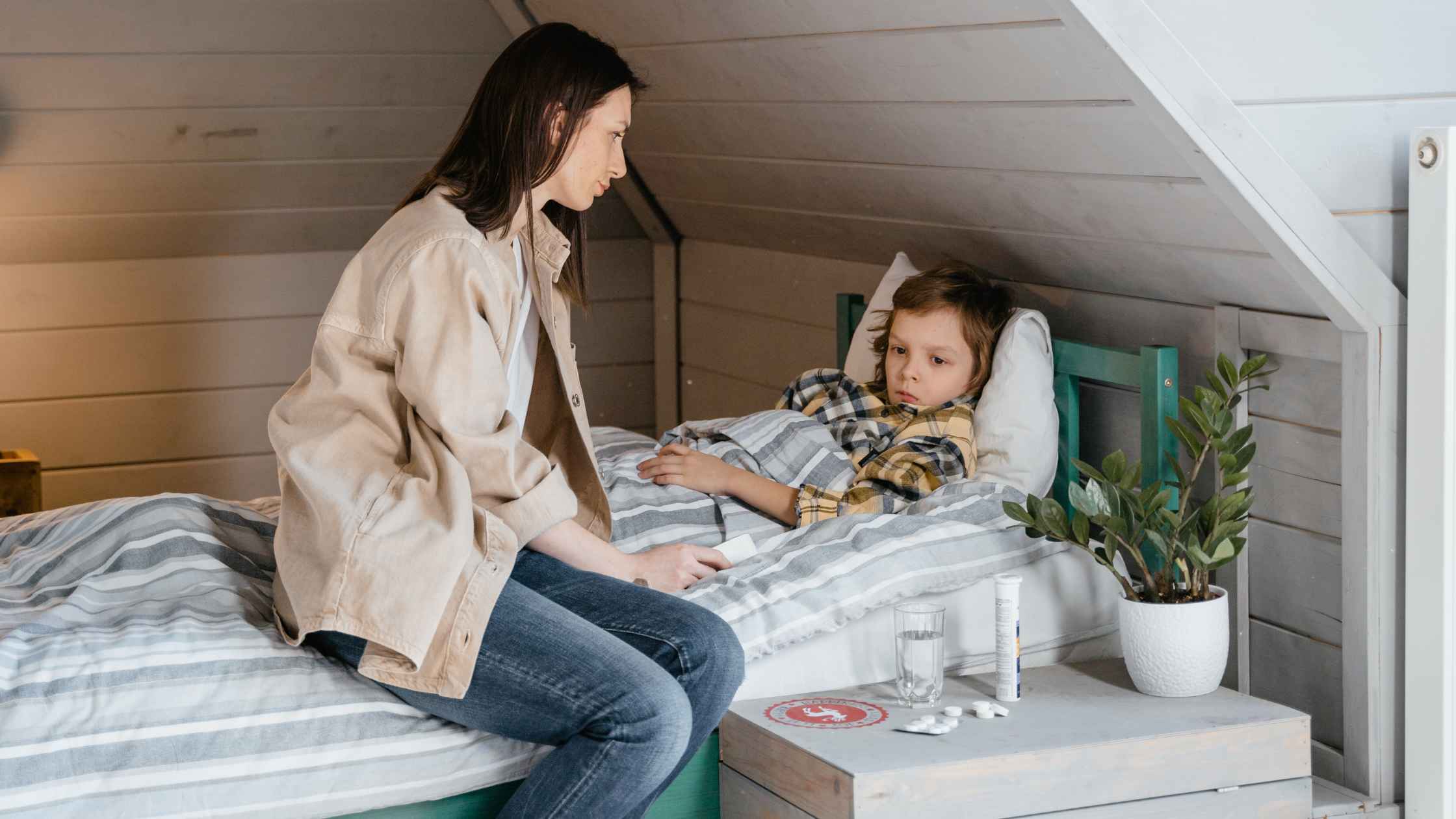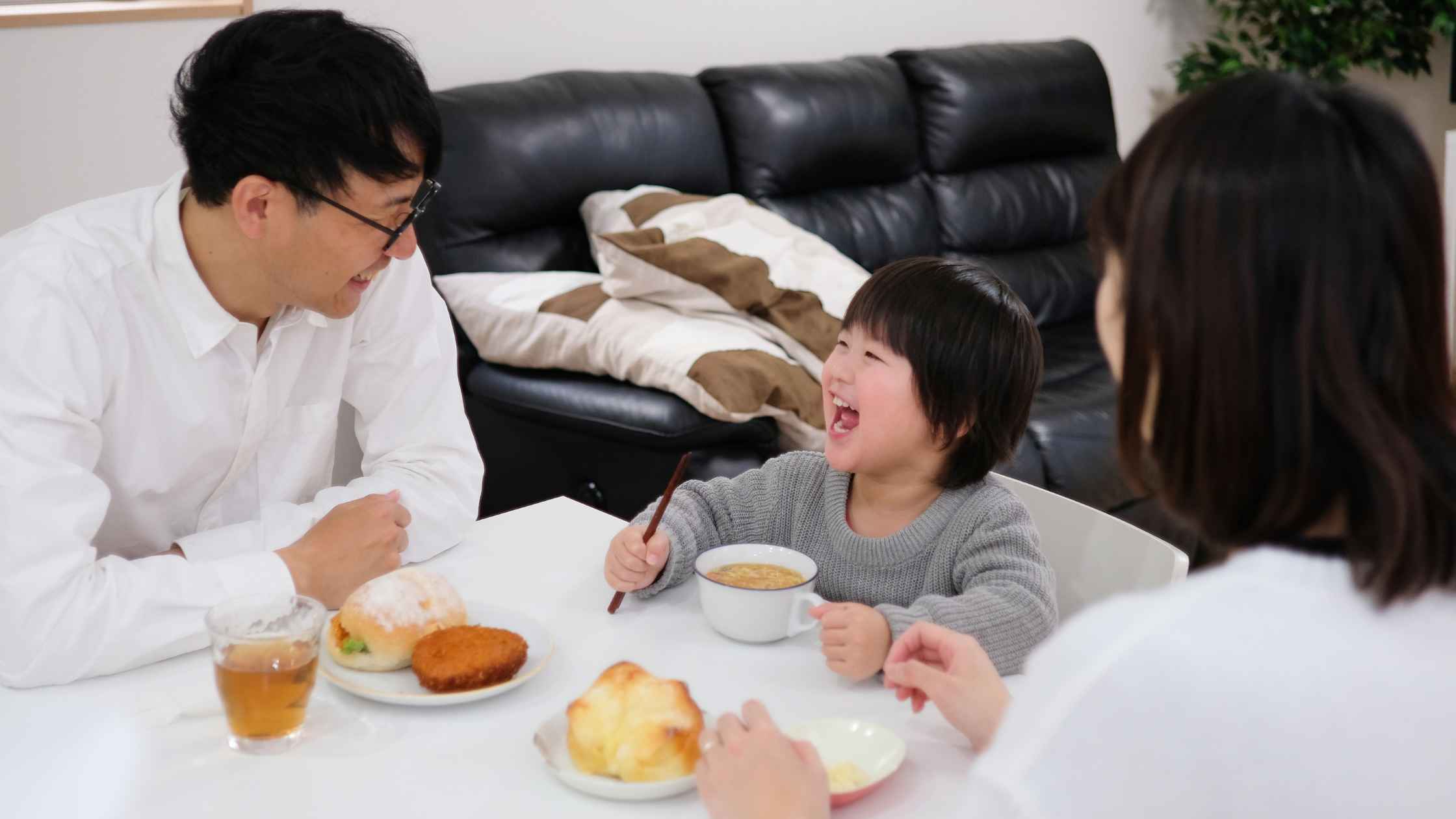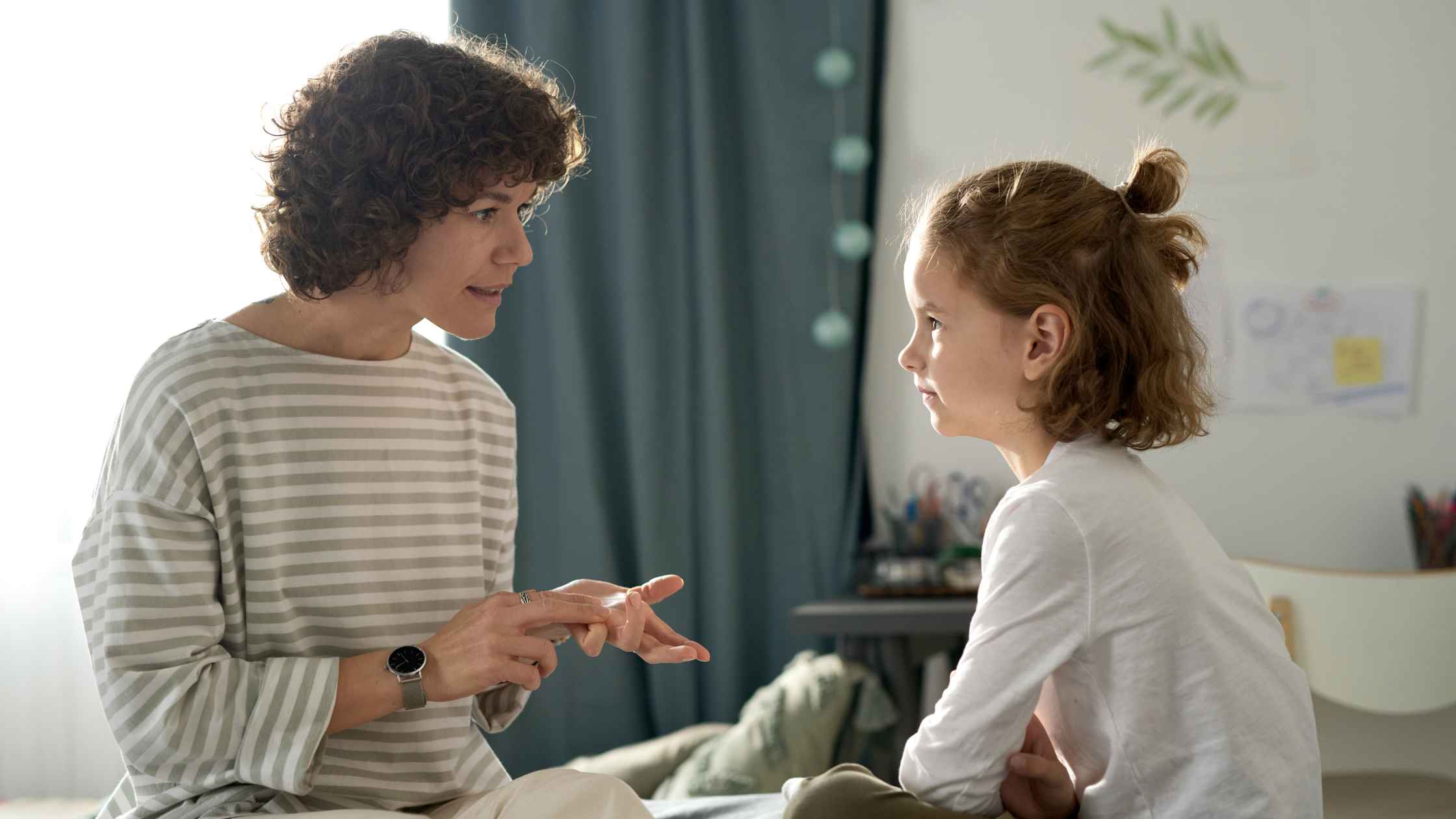As any parent knows, raising children is a challenging and often exhausting task. In the quest to navigate tantrums, picky eating, and endless questions, parents sometimes resort to telling little white lies.
From the classic “Santa is watching” to the ever-popular “we’ll see,” these fibs are a common part of parenting. But why do parents tell these lies, and what effect do they have on children?
In this article, we’ll explore 50 common lies parents tell their kids and investigate the reasons behind them.
The Classics:
1. “Santa/the Easter Bunny/the Tooth Fairy is watching.”

Parents often invoke the presence of mythical characters to encourage good behavior in their children.
The idea that Santa is keeping tabs on who’s naughty and nice can be a powerful motivator for kids to stay on their best behavior, especially around the holidays.
2. “If you keep making that face, it’ll get stuck that way.”
This silly lie is often told to discourage kids from making weird or ugly faces.
While there’s no scientific basis for this claim, it’s a playful way for parents to encourage their children to mind their facial expressions.
3. “Eating carrots will give you night vision.”

While carrots are indeed good for eye health due to their high vitamin A content, they won’t actually give you superhero-like night vision. This lie is often told to encourage kids to eat their veggies.
4. “Watching too much TV will give you square eyes.”
This classic fib is meant to discourage kids from spending too much time in front of the television.
While excessive screen time can indeed have negative effects on children’s eyes and overall health, it won’t actually cause their eyes to become square.
5. “If you don’t eat your crusts, your hair won’t curl.”
This strange but common lie is told to get kids to eat the nutritious crusts of their bread. While there’s no real connection between crust consumption and hair curliness, it’s a harmless way to encourage kids to finish their food.
6. “Cracking your knuckles will give you arthritis.”

Many parents tell this lie to discourage their children from cracking their knuckles, as the sound can be annoying to some people.
However, there’s no scientific evidence to support the claim that knuckle-cracking leads to arthritis.
7. “Coffee will stunt your growth.”
Parents often say this to discourage their kids from drinking coffee or other caffeinated beverages.
While it’s true that caffeine can have negative effects on children’s health, there’s no direct link between coffee consumption and stunted growth.
8. “If you go outside with wet hair, you’ll catch a cold.”
This lie is often told to encourage kids to dry their hair before going outside in cold weather.
While it might be chilly and uncomfortable to have wet hair in the cold, it won’t directly cause a cold, as colds are caused by viruses.
9. “If you swallow gum, it will stay in your stomach for seven years.”
This myth has been around for generations, but it’s not actually true.
While gum is indeed difficult to digest, it will eventually pass through your digestive system just like any other food.
10. “The crust is the healthiest part of the bread.”

Parents often tell this lie to encourage their kids to eat the crust of their bread, as it’s often the part that gets left behind.
While bread crusts do contain some additional nutrients, they aren’t necessarily the healthiest part of the bread.
11. “If you eat too much sugar, you’ll get diabetes.”
This lie is often told to discourage kids from consuming too many sugary treats.
While eating excessive amounts of sugar can indeed contribute to weight gain and other health issues, it doesn’t directly cause diabetes.
12. “If you don’t wear a jacket, you’ll catch a cold.”
Similar to the wet hair myth, this lie is told to encourage kids to bundle up in cold weather. However, colds are caused by viruses, not cold temperatures.
13. “If you don’t go to bed early, the Boogeyman will get you.”

This lie is often used to scare kids into going to bed on time. By invoking the presence of a scary, imaginary creature, parents hope to encourage their children to stick to a bedtime routine.
14. “Eating spinach will make you strong like Popeye.”
This lie is a reference to the classic cartoon character Popeye, who gains superhuman strength after eating a can of spinach.
While spinach is indeed a nutritious vegetable, it won’t instantly give you bulging biceps.
15. “If you sit too close to the TV, you’ll go blind.”
This lie is similar to the square eyes myth and is meant to discourage kids from sitting too close to the television screen. While sitting too close can indeed cause eye strain, it won’t actually cause blindness.
16. “If you touch a toad, you’ll get warts.”

This myth has been around for ages, but it’s not actually true. Warts are caused by a virus, not by touching amphibians.
However, this lie may discourage kids from handling toads and frogs, which can carry bacteria and other germs.
Food and Treat-Related Fibs:

17. “We’re out of cookies/candy/ice cream.”
Parents often tell this lie to avoid giving their kids too many sugary treats. By claiming that the treat jar is empty, parents can avoid the inevitable sugar rush and subsequent crash.
18. “This food is spicy/too hot for kids.”
This lie is often told to discourage kids from eating certain foods that parents don’t want them to have. By claiming that the food is too spicy or hot for kids, parents can avoid having to share their own meals or snacks.
19. “Broccoli is little trees for giants.”

This lie is a playful way to encourage kids to eat their vegetables. By making broccoli seem like a magical food fit for giants, parents can make it more appealing to their children.
20. “Fish sticks are made from chicken.”
This lie is told to encourage picky eaters to try new foods. By claiming that fish sticks are actually made from a familiar food like chicken, parents can make them seem less intimidating.
21. “Eating bread crusts will make your hair curly.”
Similar to the lie about bread crusts and hair growth, this fib is meant to encourage kids to eat the nutritious crusts of their bread.
While there’s no actual connection between crust consumption and hair texture, it’s a harmless way to discourage food waste.
22. “The ice cream truck plays music when it’s out of ice cream.”
This clever lie is told to avoid the inevitable begging for treats when the ice cream truck comes around.
By claiming that the music only plays when the truck is out of ice cream, parents can save themselves from having to say no to their kids’ requests.
23. “If you swallow a watermelon seed, a watermelon will grow in your stomach.”

This silly lie is meant to discourage kids from swallowing watermelon seeds.
While it’s not actually possible for a watermelon to grow inside a person’s stomach, this fib can add a touch of magic and humor to summer picnics and barbecues.
24. “Eating too much sugar will give you worms.”
This lie is a variation on the diabetes myth and is meant to discourage kids from consuming too many sugary treats.
While eating too much sugar can indeed have negative health effects, it won’t actually cause worms to grow in your body.
25. “This food tastes yucky to kids.”

This lie is often told to discourage kids from asking for a bite of their parents’ food. By claiming that the food tastes bad to kids, parents can keep their own meals and snacks to themselves.
26. “If you don’t finish your meal, it means you don’t love me.”
This emotionally manipulative lie is meant to encourage kids to clean their plates. By tying food consumption to parental love, parents hope to get their kids to eat more.
However, this lie can have negative effects on children’s relationships with food and their parents.
Behavior and Responsibility-Related Lies:

27. “I have eyes in the back of my head.”
This playful lie is meant to encourage kids to behave even when their parents aren’t looking.
By claiming to have superhuman abilities, parents can make their kids feel like they’re always being watched and discourage them from misbehaving.
28. “If you don’t clean your room, it’ll get so messy that you won’t be able to find your way out.”
This exaggeration is meant to encourage kids to keep their rooms tidy. By painting a vivid picture of the consequences of a messy room, parents hope to motivate their kids to clean up after themselves.
29. “If you don’t brush your teeth, they’ll all fall out.”
This lie is meant to encourage good dental hygiene habits in children.
While it’s true that poor oral hygiene can lead to tooth decay and other dental problems, it’s unlikely that all of a child’s teeth will fall out if they skip brushing once in a while.
30. “The police will arrest you if you don’t wear your seatbelt.”

This lie is meant to encourage kids to wear their seatbelts in the car. While it’s true that wearing a seatbelt is a legal requirement in many places, it’s unlikely that a child would actually be arrested for not wearing one.
31. “If you don’t share your toys, they’ll all run away.”
This lie is meant to encourage kids to share with their siblings and friends.
By personifying toys and giving them the ability to run away, parents hope to make sharing seem like a more appealing option.
32. “If you tell a lie, your nose will grow like Pinocchio’s.”
This lie is a reference to the classic children’s story of Pinocchio, whose nose would grow every time he told a lie.
By invoking this story, parents hope to discourage their kids from lying and encourage them to tell the truth.
33. “If you don’t do your homework, you’ll never get a good job.”

This lie is meant to encourage kids to take their schoolwork seriously.
While it’s true that education is important for future success, it’s not necessarily true that missing a single homework assignment will ruin a child’s chances of getting a good job.
34. “If you don’t clean behind your ears, potatoes will grow there.”
This silly lie is meant to encourage kids to clean behind their ears when bathing.
While it’s important to maintain good hygiene, it’s not actually possible for potatoes or any other plants to grow behind a person’s ears.
35. “If you’re not good, I’ll leave you here at the store.”
This harsh lie is meant to discourage kids from misbehaving in public places.
While it’s understandable that parents want their kids to behave well in stores and other public areas, threatening to abandon them is a cruel and potentially traumatic tactic.
36. “If you don’t stop crying, I’ll give you something to cry about.”
This lie is meant to discourage kids from crying or whining excessively. By threatening to give them a reason to cry, parents hope to shock their kids into calming down.
However, this tactic can be emotionally harmful and may teach kids to suppress their emotions.
Deflection and Distraction Techniques:

37. “I’ll think about it.”
This common parental phrase is often used to avoid giving a direct answer to a child’s request.
By saying “I’ll think about it,” parents can buy themselves some time to consider the request or come up with a more definitive answer.
38. “We’ll see.”
Similar to “I’ll think about it,” this phrase is often used to avoid making a commitment.
By saying “we’ll see,” parents can keep their options open and avoid disappointing their kids if they later decide to say no.
39. “Maybe later.”
This phrase is another way for parents to avoid giving a direct answer to a child’s request.
By saying “maybe later,” parents can put off making a decision and avoid having to deal with their child’s reaction in the moment.
40. “Ask your father/mother.”

This deflection technique is often used when one parent doesn’t want to take responsibility for making a decision.
By telling their child to ask the other parent, they can avoid having to say yes or no themselves.
41. “Not today, but maybe next time.”
This phrase is a way for parents to say no to a request without completely shutting down the possibility of it happening in the future.
By leaving the door open for “next time,” parents can soften the blow of a rejection.
42. “I don’t know, what do you think?”
This question is a way for parents to turn the tables on their kids and get them to think for themselves.
By asking their child’s opinion, parents can encourage critical thinking and problem-solving skills.
43. “It’s a surprise!”

This exclamation is often used to build excitement and anticipation for a future event or activity.
By keeping the details a secret, parents can make the surprise feel more special and rewarding.
44. “I have a special job for you to do first.”
This distraction technique is often used to redirect a child’s attention away from a request or demand.
By giving them a task to complete first, parents can buy themselves some time and avoid having to deal with the original issue.
45. “Let’s play a game instead.”
Similar to the special job tactic, this distraction technique is used to redirect a child’s attention away from a problematic behavior or request.
By suggesting a fun activity or game, parents can change the subject and avoid a potential meltdown.
The Outrageous and Absurd:

46. “The toy store/amusement park/zoo is closed.”
This outrageous lie is often told to avoid a much-anticipated outing that parents don’t have the time, energy, or money for.
By claiming that the desired destination is closed, parents can avoid a potential tantrum or meltdown.
47. “The characters on TV can see you too.”
This absurd lie is meant to encourage good behavior in front of the television.
By claiming that the characters on TV can see and judge a child’s actions, parents hope to discourage misbehavior and encourage their kids to be on their best behavior.
48. “If you unscrew your belly button, your bottom will fall off.”
This ridiculous lie is meant to discourage kids from playing with their belly buttons.
While it’s not actually possible for a person’s bottom to fall off, this lie can add a touch of silly humor to the sometimes frustrating task of getting kids to keep their hands to themselves.
49. “If you eat a seed, a tree will grow out of your belly.”
Similar to the watermelon seed myth, this absurd lie is meant to discourage kids from swallowing fruit seeds.
While it’s not actually possible for a tree to grow inside a person’s body, this lie can make mealtime a bit more fun and imaginative.
50. “I know everything.”
This bold claim is meant to establish a parent’s authority and discourage their kids from trying to hide things from them.
While it’s obviously not true that parents know everything, this lie can be a useful tool for keeping kids in line and encouraging them to be honest.
Conclusion:
From little fibs to tall tales, parents often resort to telling white lies to their children. While these lies may seem harmless, they can have unintended consequences.
Some lies, like those about mythical characters or silly consequences, are meant to encourage good behavior or make life a bit more magical. Others, like lies about health and nutrition, can be more problematic.
Ultimately, it’s up to parents to use their best judgment when deciding what to tell their kids. Honesty is generally the best policy, but a sprinkle of imagination and a dash of playful deception can add some fun to the challenging job of parenting.
Do you remember any white lies your parents told you as a child? Share your stories in the comments below!




